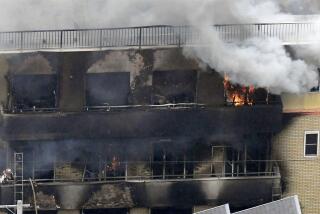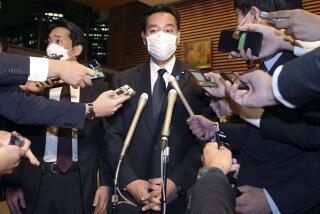Cult Leader Confesses to Tokyo Gas Attack, TV Station Says : Japan: But other media cite police sources that deny Aum Supreme Truth guru has admitted guilt in subway assault, other crimes. Trial set this month.
- Share via
TOKYO — Breaking a 141-day silence, cult leader Shoko Asahara has begun confessing to involvement in the murderous poison gas attack on Tokyo subway riders earlier this year and a string of other killings and kidnapings, according to Japanese news reports.
“In each case, I gave the order and group leaders carried it out,” the NHK public television network quoted Asahara as saying in a written confession.
But a follower of Aum Supreme Truth, Asahara’s cult, immediately issued a statement in Tokyo saying the confession was forced and was too “abstract” to be used as evidence. The statement said Asahara will plead innocent in his trial, scheduled to begin in three weeks.
Other Japanese media quoted police sources denying the report that Asahara has confessed.
“Asahara remains silent, and investigators did not force him to confess,” a metropolitan police source said, according to Yomiuri Shimbun, a leading daily newspaper.
Asahara, 40, has steadfastly kept silent since his arrest, when he was discovered hiding in a secret room in his group’s Mt. Fuji headquarters. With his trial for six different crimes set to begin Oct. 26, Japanese police reportedly began pressuring him to confess by threatening him with the dissolution of his cult, according to reports.
With mystical yogic techniques and a doomsday religious vision, Asahara managed to attract an estimated 10,000 followers in Japan--including brilliant scientists and technologists from elite national universities--and 30,000 in Russia. His arrest in May on gruesome murder charges led to a national outpouring of angst over how Japan’s well-ordered society could produce such a cult, and spurred controversial moves to tighten laws against all religious corporations.
According to reports leaked to the media by unnamed Japanese authorities, several of Asahara’s top cult lieutenants have confessed to manufacturing sarin, a deadly nerve gas, and using it in attacks in Tokyo and the central town of Matsumoto. The March 20 subway gassing in Tokyo killed 12 and sickened 5,500 morning rush-hour commuters; seven people were killed in Matsumoto in June, 1994.
In addition, cult followers have reportedly confessed to involvement in the slaying of a fellow Supreme Truth member trying to help a colleague escape, and to the kidnaping and murder of a public accountant and of an anti-cult attorney, his wife and their 1-year-old son.
The members reportedly told police that they carried out the crimes under direct orders from Asahara. But without the guru’s own acknowledgment of the crimes, the case would be regarded as less than airtight in the Japanese justice system, which relies heavily on confessions.
Confessions are obtained in the overwhelming majority of cases here, leading to a 99% criminal conviction rate. But human rights groups such as Amnesty International have long charged that many confessions are coerced after long hours of brutal interrogation, psychological torture and sometimes physical abuse.
So far, however, Supreme Truth attorneys have not complained of any police abuse of Asahara. They report that he has intensified his religious training in custody and, as a result, has gradually begun recovering sight in his right eye.
One media report quoted Asahara as saying he would “completely surrender” to authorities after being informed by his lawyer, Shoji Yokoyama, that they were preparing legal measures to disband the cult.
Under the national “Subversive Activities Prevention Law,” organizations can be disbanded if they have committed terrorist acts and are deemed likely to repeat them. The law has been applied against eight individuals, all radical leftists, but has never been used against a group, thanks to protests by Communists and Socialists that it could be used to stifle dissent against the government. Socialist Prime Minister Tomiichi Murayama is reportedly still nervous about applying the law against Supreme Truth.
Meanwhile, Asahara has issued a message urging seven remaining cult fugitives to surrender, Supreme Truth spokesman Fumihiro Joyu said Wednesday.
The search for the members has intensified in recent weeks, with police plastering their photos in subways and trains and even on lanterns strung in a public square in the busy Shibuya district of Tokyo.
More to Read
Sign up for Essential California
The most important California stories and recommendations in your inbox every morning.
You may occasionally receive promotional content from the Los Angeles Times.











